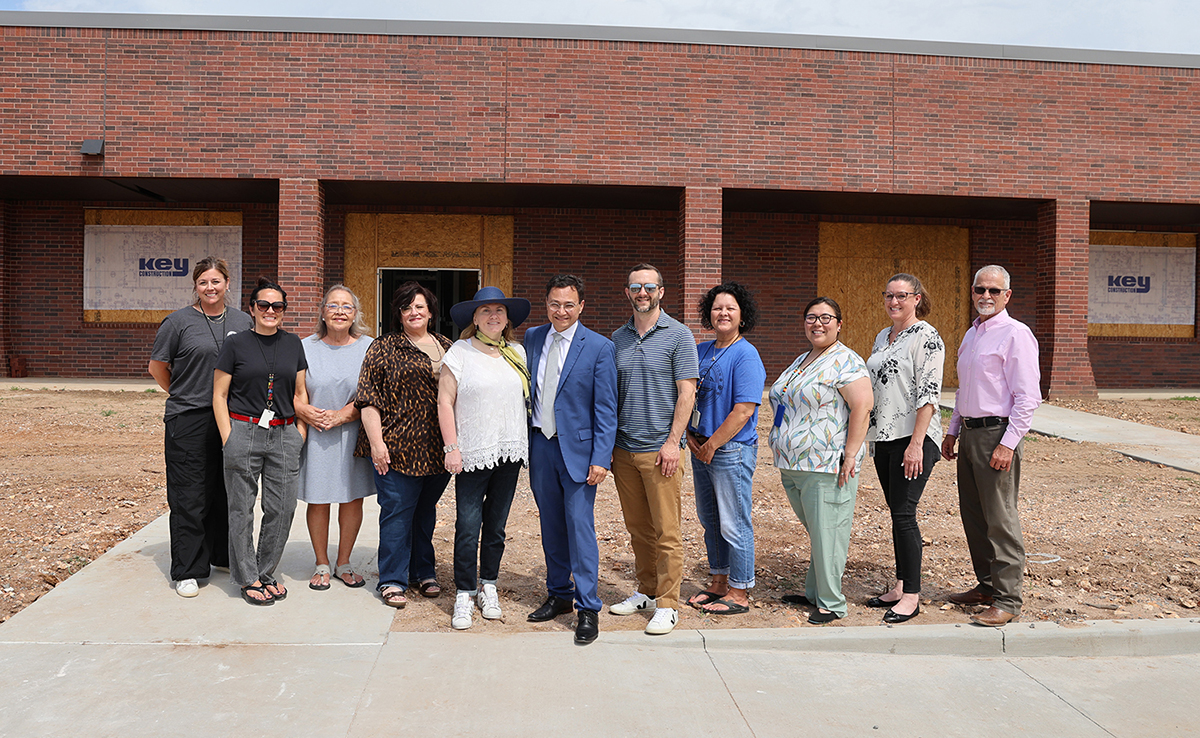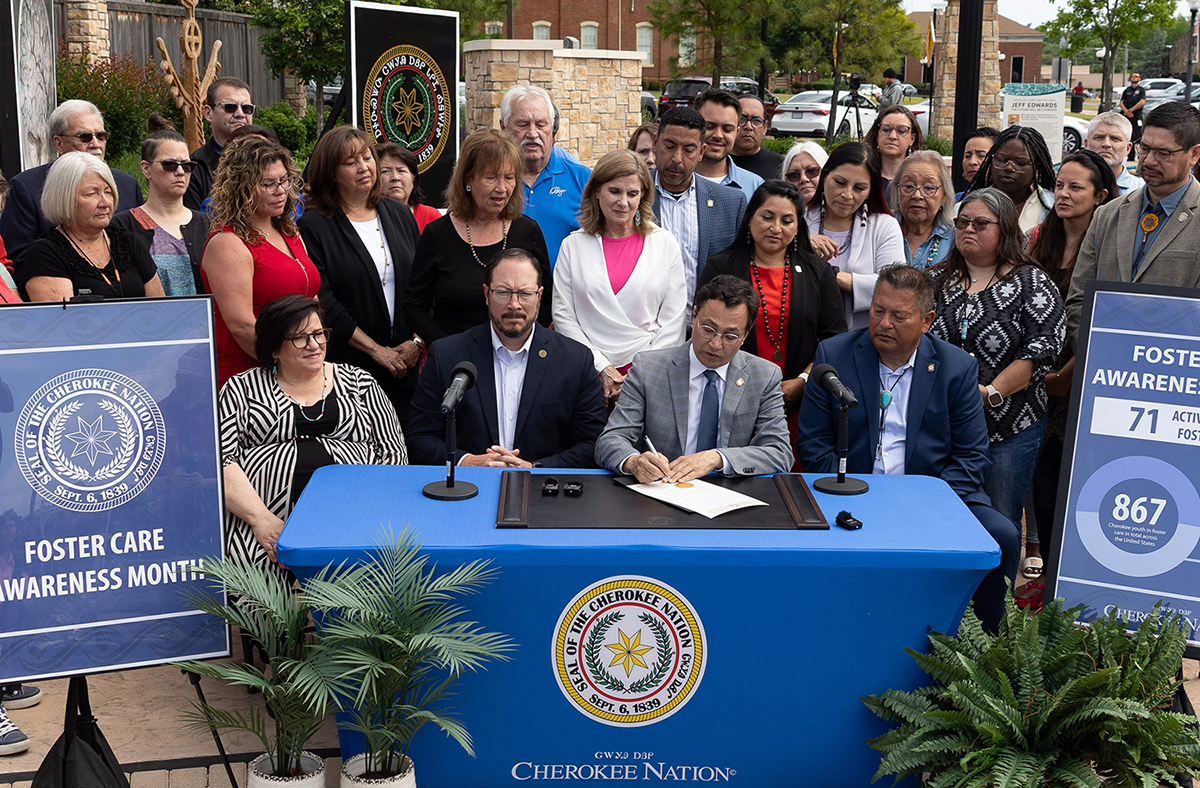TAHLEQUAH, Okla. — Cherokee Nation Principal Chief Chuck Hoskin Jr. signed a proclamation May 12 declaring May as Foster Care Awareness Month within the Cherokee Nation Reservation and encouraging more Cherokee families to consider the path of becoming a certified foster home for Cherokee children.
“The children who are in need of foster care deserve to live in dignity,” said Chief Hoskin. “They deserve to have this blanket of protection and support from the Cherokee Nation. It's a duty that we all share for the good of not only those individual Cherokee young people but all of us. Their future will be the measure of our success as a Nation.”
The Cherokee Nation is the largest tribe in the U.S. with more than 470,000 citizens spread across the country. There are currently 876 Cherokee youth in the foster care system across the U.S., with 447 of those children living within the Cherokee Nation Reservation. The tribe has 71 active Cherokee foster homes in Oklahoma and Arkansas.
Ten percent of children in foster care in the State of Oklahoma are Cherokee citizens.
“The Cherokee Nation Indian Child Welfare team is such an amazing group of people who work tirelessly to advocate on behalf of secure, safe environments for our Cherokee children” said Deputy Chief Bryan Warner. “They have such creative ways to capture your attention and bring awareness to foster care.”
Chief Hoskin and First Lady January Hoskin also joined ICW staff and other tribal leaders this week to tour the future new headquarters of Cherokee Nation’s ICW in Tahlequah. The new space when completed will be more functional and provide additional room for ICW staff to properly serve Cherokee families. The project will also allow ICW staff to be housed in one facility.

“Every child deserves a place where they can feel safe, loved, and seen. Foster care isn't just about providing a home – it's about offering hope, stability, and the chance for Cherokee children to discover their potential. It is especially important that they remain connected to their Cherokee culture and language, which is why I am so proud of the Indian Child Welfare department and their work with Cherokee children,” said First Lady January Hoskin. “The greatest gift we can give these children is to show them they matter, that their story isn't over, and that they belong. ICW works hard every day to make that happen. We all dream of a day when we have more foster homes than children waiting; until then, we will keep advocating for these children and the families who support them on their journey.”
During Monday’s recognition of Foster Care Awareness Month, Chief Hoskin also proposed that the Cherokee Nation’s Fostering HOPE program, which began in 2022 as a pilot program funded by the tribe’s Respond, Recover and Rebuild plan, continue to offer protective and supportive services to young adults aging out of the foster care system. Eligible Cherokee participants in the program receive a $500 monthly stipend for up to two years after aging out of the foster care system.
Chief Hoskin, Deputy Chief Warner and Council Speaker Mike Shambaugh pledged to work together to fund Fostering HOPE in the next fiscal year’s budget.
“This issue is so important to First Lady January Hoskin, and it is one that is certainly worth our continued attention,” Chief Hoskin said. “When children in foster care turn 18, far too many enter adulthood with little or no support. It can be a confusing and scary time for young people who have already been through a lot. The $500 stipend and related support services will make that transition easier.”
To qualify for Cherokee Nation’s Fostering HOPE program, participants must be employed, actively seeking employment or working toward career training or a degree program. The monthly stipends can begin the month a participant turns 18 years old and end at age 21. Those who are actively working toward a career training or degree program at age 21 may remain in the program until age 23 or until their training or degree is complete. Participants will also meet with a Fostering HOPE counselor every two months and complete financial wellness curriculum.
Among other initiatives to support foster care awareness, the Cherokee Nation in 2022 created a new family leave policy providing all qualifying parents who work full time for Cherokee Nation with paid time off for the birth of a child or adoption through the tribe’s Indian Child Welfare department. The policy also expanded the tribe’s existing paid foster parent leave by adding an extra five days of leave.
The Cherokee Nation earlier this year also named Sally Wilson as Senior Director of the tribe’s Indian Child Welfare department, which oversees foster care efforts. Wilson has been with Cherokee Nation Indian Child Welfare for more than 17 years, where she focused on the recruitment, training and retention of foster and adoptive homes. She is a third generation foster and adoptive parent and was also recently selected for the Minority Leadership Development Program through Adopt US Kids, a prestigious fellowship for leaders in the field of child welfare.
“I would like to thank Sally for being one of the kindest souls,” Deputy Chief Warner said. “She has an amazing team behind her as well. Together, they ensure that foster care awareness isn’t simply something we talk about one day a year; instead, it’s an ongoing commitment each and every day.”
Cherokee citizens can learn more about becoming a foster or adoptive parent by visiting the Indian Child Welfare website at http://icw.cherokee.org/, calling 918-458-6900, or emailing

